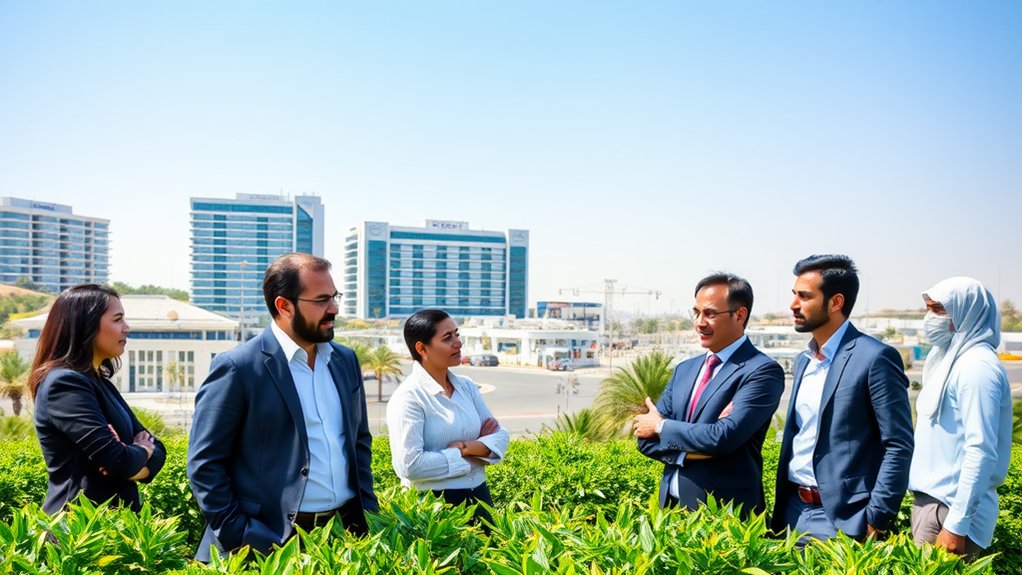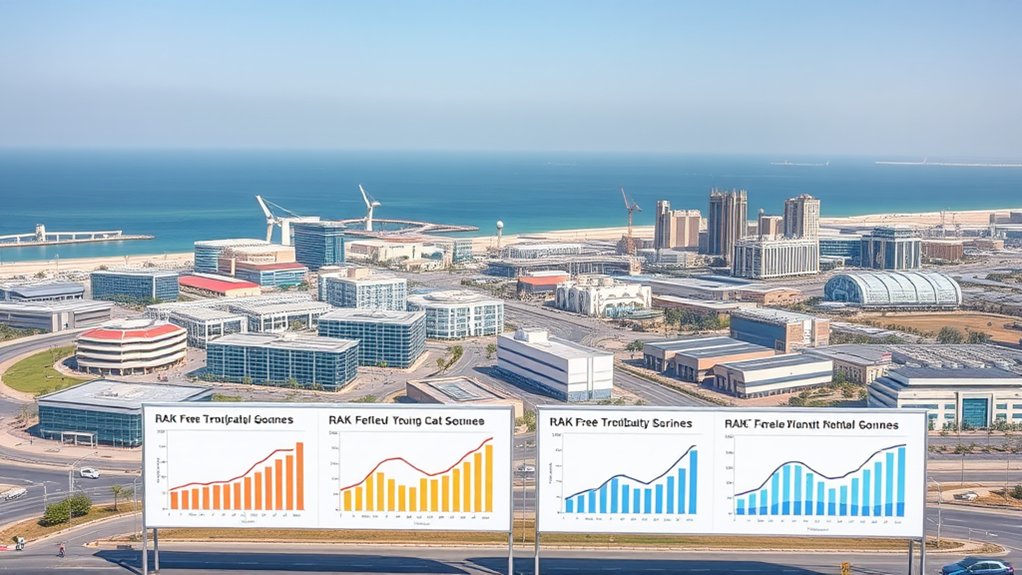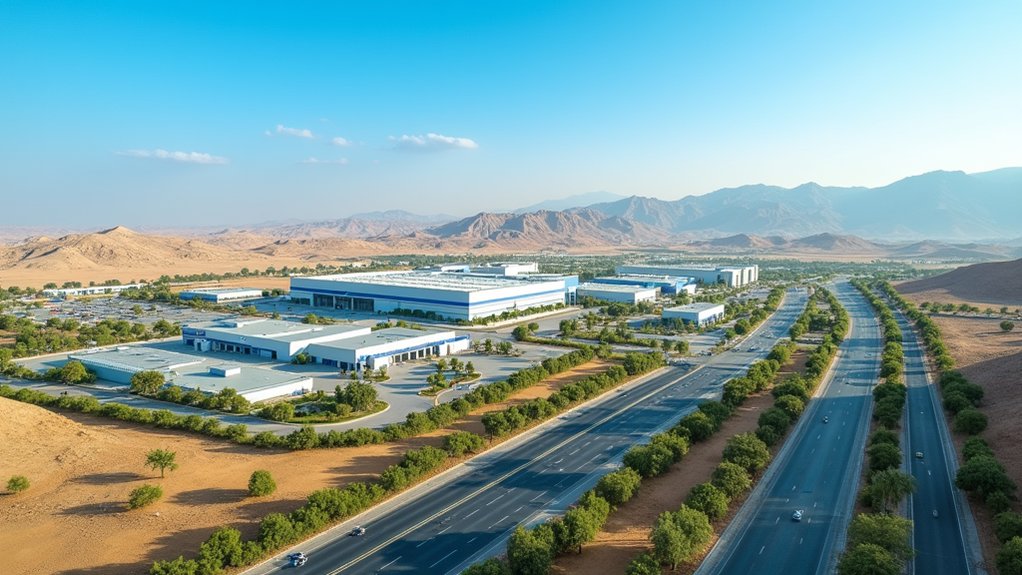Picture a bustling marketplace where businesses thrive under the warm sun of favorable tax policies. In the RAK Free Zone, corporate taxation plays a vital role in shaping your business landscape, with its zero percent corporate tax rate acting as a magnet for foreign investment. This environment not only minimizes operational costs but also opens doors for growth and innovation. However, the landscape isn't without its complexities and challenges. What do these dynamics mean for your business strategy and long-term sustainability?
Overview of RAK Free Zone

If you're considering setting up a business in the UAE, the RAK Free Zone offers a unique opportunity. This zone is designed to attract foreign investment and promote business growth. With 100% ownership allowed, you can run your company without needing a local partner. The RAK Free Zone also provides a range of business opportunities across various sectors, including manufacturing, trading, and services. You'll find flexible office solutions and competitive leasing options, making it easier to establish your venture. The straightforward registration process and minimal bureaucracy further enhance your experience. Overall, the RAK Free Zone stands out as an attractive destination for entrepreneurs looking to expand in a rapidly growing market. Additionally, the cost of living and business operations in the RAK Free Zone are 25-50% lower than other UAE regions, making it a financially savvy choice for startups.
Importance of Corporate Taxation
Understanding the importance of corporate taxation is essential for businesses operating in the RAK Free Zone, as it directly impacts financial planning and compliance. A clear tax policy helps you navigate your obligations, ensuring you meet legal requirements. This awareness can prevent costly penalties and enhance your company's reputation. Furthermore, corporate taxation plays an important role in shaping the economic impact of your business. By understanding how taxes affect your bottom line, you can make informed decisions about investments and growth. Additionally, a well-structured tax strategy allows you to allocate resources effectively, maximizing potential returns. In conclusion, recognizing the importance of corporate taxation is crucial for maintaining compliance and making strategic business choices in the RAK Free Zone. Additionally, the introduction of corporate tax in the UAE aims to diversify the economy, which can present new opportunities for businesses to innovate and grow.
Zero Corporate Tax Benefits

In the RAK Free Zone, zero corporate tax benefits play an essential role in attracting foreign investment. This tax advantage encourages business growth by allowing companies to reinvest their profits. Additionally, it simplifies compliance procedures, making it easier for businesses to operate smoothly. The UAQ Free Zone also offers similar tax incentives, making it an attractive alternative for investors.
Attracting Foreign Investment
While many regions grapple with high corporate tax rates, the RAK Free Zone stands out by offering a zero corporate tax benefit that greatly attracts foreign investment. This appealing tax structure provides businesses with a competitive edge. You'll find that these tax incentives encourage companies from around the globe to set up operations in the free zone.
Key advantages include:
- Enhanced profit retention due to no corporate taxes
- Increased cash flow for reinvestment in operations
- Simplified accounting and compliance processes
- A favorable business environment that promotes growth
- The RAK Free Zone also benefits from supportive government policies that further enhance the investment climate.
Encouraging Business Growth
The zero corporate tax benefit in the RAK Free Zone not only attracts foreign investment but also plays a pivotal role in encouraging business growth. This environment allows businesses to reinvest profits into expansion and implement effective growth strategies. With no corporate tax, companies can allocate more resources towards innovation, hiring, and scaling operations. This leads to increased competitiveness and sustainability in the market. Additionally, the flexibility of corporate structure options enhances the ability of businesses to adapt and thrive in a dynamic economic landscape.
Here's a quick overview of how the zero corporate tax can influence your business:
| Benefit | Impact on Growth Strategies | Example of Business Expansion |
|---|---|---|
| Increased Profits | More funds for reinvestment | Opening new branches |
| Attracts Investors | Enhanced capital for projects | Securing funding for R&D |
| Competitive Pricing | Ability to lower prices | Gaining market share |
| Boosts Hiring | Expanding workforce | Hiring specialized talent |
| Encourages Innovation | Investing in new technologies | Developing new products |
Simplifying Compliance Procedures
Steering through compliance procedures can be intimidating for businesses, but the zero corporate tax framework in the RAK Free Zone considerably simplifies this process. You'll find that compliance automation tools help streamline your efforts, allowing you to focus more on growth. Additionally, the regulatory updates are straightforward, ensuring you stay informed without hassle.
Here are some ways the RAK Free Zone eases your compliance burden:
- Clear guidelines for documentation and filings
- Minimal bureaucratic red tape
- Regular workshops on compliance best practices
- Support from local authorities for queries
With these features, managing compliance becomes less stressful, making it easier for you to navigate the business landscape in the RAK Free Zone. Enjoy the benefits of simplicity and efficiency.
Incentives for Businesses
As you explore opportunities in the RAK Free Zone, you'll find a range of incentives designed to attract and support businesses. These incentives include various tax benefits that can greatly lower your operational costs.
| Tax Incentives | Business Benefits |
|---|---|
| 100% foreign ownership | Enhanced profit retention |
| No corporate tax | Increased investment potential |
| No personal income tax | Better employee attraction |
| Zero import/export duties | Improved cash flow management |
These advantages can help your business thrive in a competitive market. By taking advantage of the tax incentives offered, you can maximize your profits and invest more in growth. Overall, these incentives create an attractive environment for both new and established businesses in the RAK Free Zone.
Types of Business Entities

When choosing a business entity in the RAK Free Zone, you have several options. You can set up a Limited Liability Company (LLC), establish a branch office, or start as a sole proprietorship. Each structure has its own benefits and requirements that can impact your operations and tax obligations.
LLC vs. Free Zone
Choosing between an LLC and a free zone entity can greatly impact your business operations in RAK. Each option offers unique advantages and drawbacks that affect your business structure and compliance responsibilities.
- LLC advantages include liability protection and ownership flexibility, which allows for up to 49% foreign ownership.
- Free zone benefits often involve tax exemptions and simplified regulatory compliance, making them attractive for foreign investors.
- Taxation differences between the two can influence profit distribution methods.
- Understanding these factors can help you choose the best entity type for your needs.
Evaluate your priorities regarding taxation, liability, and operational flexibility to make an informed choice that aligns with your business goals.
Branch Office Structure
Understanding the branch office structure is essential for businesses looking to establish a presence in RAK. A branch office allows you to operate as an extension of your main company, which can be beneficial. One of the branch office advantages is that it usually requires less capital to set up compared to other entity types. You can also benefit from the existing brand recognition. However, there are branch office limitations to evaluate. For instance, you may face restrictions on local operations and might not be able to engage in certain activities without approval. Additionally, profits generated may be subject to taxation in your home country. Weighing these factors can help you decide if a branch office is right for your business.
Sole Proprietorship Options
A sole proprietorship offers a straightforward way to start your business in the RAK Free Zone. This structure is ideal for individuals who want full control over their operations. However, keep in mind that with this ownership comes personal responsibility for business liabilities. Here are some key features of a sole proprietorship:
- Simple registration process
- Full control over decision-making
- Direct taxation on personal income
- Limited access to capital compared to corporations
In a sole proprietorship structure, you're the sole owner, which simplifies management but also increases your business liability. Understanding these factors can help you decide if this type of entity suits your business goals in the RAK Free Zone.
Compliance Requirements
Steering compliance requirements in the RAK Free Zone is vital for businesses looking to thrive in this unique environment. You'll need effective compliance strategies to meet your reporting obligations and navigate the regulatory frameworks. Familiarizing yourself with documentation requirements is essential, as is understanding the audit processes that may apply to your business. Regular tax filing is a key part of your legal responsibilities, and you should be aware of the compliance costs involved. Proper record keeping can save you from penalty implications down the line. Staying organized and informed will help guarantee that you meet all requirements and maintain a good standing in the RAK Free Zone. Being proactive about compliance will support your business's success.
Impact on Profitability

Understanding the impact of corporate taxation on profitability is vital for your business in the RAK Free Zone. Tax incentives can greatly boost your profit margins, while effective profit retention strategies guarantee you keep more of what you earn. By focusing on these areas, you can enhance your overall financial performance.
Tax Incentives Overview
Tax incentives in the RAK Free Zone can greatly boost your company's profitability. By taking advantage of these incentives, you can enjoy significant tax benefits that enhance your financial performance. These advantages can lead to reduced operational costs and increased investment potential. Here are some key points to evaluate:
- No corporate tax: Enjoy a tax-free environment for your business.
- 100% foreign ownership: Retain full control of your company without local partners.
- Repatriation of profits: Withdraw earnings without restrictions.
- No import/export duties: Save on costs associated with moving goods in and out.
These factors contribute to a more favorable business climate, making the RAK Free Zone an attractive option for entrepreneurs looking to maximize profits.
Profit Retention Strategies
When you implement effective profit retention strategies in the RAK Free Zone, you can greatly enhance your company's overall profitability. Focusing on profit reinvestment strategies allows you to funnel earnings back into the business. This can lead to growth and improved operations. Additionally, strong cash flow management is essential. By monitoring your cash flow closely, you guarantee that funds are available for reinvestment when opportunities arise. This balance between saving profits and investing wisely can create a sustainable cycle of growth. Keeping an eye on expenses while maximizing revenue also supports these strategies. By prioritizing these approaches, you'll strengthen your financial position and increase your overall profitability in the competitive landscape of the RAK Free Zone.
Attraction of Foreign Investment
While many regions vie for global investment, the RAK Free Zone stands out by offering an attractive landscape for foreign investors. Its favorable tax policy implications draw attention and encourage business growth. From foreign investor perspectives, the benefits are clear.
- 100% foreign ownership is allowed.
- No corporate tax exists for most businesses.
- Efficient licensing and registration processes save time.
- Strategic location provides access to major markets.
These factors make the RAK Free Zone appealing for those looking to invest in the region. By minimizing tax burdens and simplifying regulations, it creates a welcoming environment. Ultimately, these advantages position the RAK Free Zone as a prime choice for foreign investors seeking to establish their businesses in the Middle East.
Operational Cost Advantages

When you set up your business in the RAK Free Zone, you'll enjoy several operational cost advantages. Tax exemptions can greatly lower your expenses, while reduced financial burdens help you allocate resources more efficiently. These benefits ultimately enhance your profit margins, making your venture more sustainable in the long run.
Tax Exemptions Benefits
Tax exemptions in the RAK Free Zone offer significant operational cost advantages that can enhance your business's bottom line. These tax exemption benefits allow you to allocate resources more effectively, promoting financial growth. By reducing unnecessary expenses, you can invest more in key areas of your business.
Here are some key advantages of these tax exemptions:
- No corporate tax on profits, allowing for greater retained earnings.
- Exemption from import and export duties, reducing overall supply chain costs.
- No personal income tax, benefiting owners and employees alike.
- Simplified accounting requirements, leading to lower administrative costs.
These advantages help create a more favorable environment for your business, making it easier to thrive in a competitive market.
Reduced Financial Burdens
By choosing to operate in the RAK Free Zone, you can considerably reduce your financial burdens, allowing your business to thrive without the weight of excessive operational costs. The benefits of tax savings translate into increased financial flexibility, enabling you to allocate resources more effectively. Here's a quick look at how these advantages can impact your bottom line:
| Financial Advantage | Description |
|---|---|
| Tax Savings | Lower tax liabilities boost cash flow. |
| Reduced Operational Costs | Lower costs mean more funds for growth. |
| Incentives for Startups | Support for new businesses enhances growth. |
| Streamlined Regulations | Less bureaucracy saves time and money. |
| Competitive Edge | Lower costs can improve market positioning. |
These factors collectively improve your financial standing, making it easier to invest in your future.
Enhanced Profit Margins
Operating in the RAK Free Zone can greatly enhance your profit margins. By taking advantage of lower operational costs and a favorable tax environment, you can implement effective profit optimization strategies. This allows you to focus on revenue enhancement techniques that drive growth. Here are some ways to improve your profit margins:
- Utilize state-of-the-art infrastructure to reduce overhead costs.
- Access a skilled workforce at competitive wages.
- Benefit from streamlined regulations that save time and money.
- Leverage networking opportunities with other businesses in the zone.
These factors contribute to a more efficient business model, letting you maximize profits while minimizing expenses. In the RAK Free Zone, your ability to thrive hinges on making strategic financial decisions that enhance overall profitability.
Strategic Planning for Taxation
When maneuvering the complexities of taxation in the RAK Free Zone, effective strategic planning can considerably enhance your business's financial health. Developing a solid tax strategy is crucial. Start by analyzing your current tax position and identifying areas for improvement. Incorporate financial forecasting to anticipate future tax liabilities and cash flow needs. This proactive approach allows you to allocate resources effectively and seize opportunities for deductions or credits. You'll want to stay informed about changes in tax laws and regulations that may affect your business. Regularly revisiting your tax strategy guarantees it aligns with your growth objectives. By planning ahead, you can minimize your tax burden while maximizing your profits, ultimately leading to a more sustainable and prosperous business.
Comparison With Other Free Zones

Many businesses considering the RAK Free Zone often compare it to other free zones, such as those in Dubai or Abu Dhabi, to evaluate their tax advantages and operational benefits. A thorough tax structure comparison reveals distinct differences that can impact your decision.
Here's a quick tax incentives analysis:
- RAK offers a zero percent corporate tax rate for many businesses.
- Dubai's free zones also provide tax exemptions but may have specific conditions.
- Abu Dhabi's free zones may vary in tax incentives based on business types.
- RAK Free Zone has fewer restrictions on foreign ownership compared to some competitors.
Understanding these differences helps you make informed choices about where to set up your business, maximizing your tax benefits.
Effects on Growth Potential
The favorable tax environment in the RAK Free Zone greatly influences growth potential for businesses. Without the burden of high corporate taxes, you can easily reinvest profits into your operations. This reinvestment opens up various growth opportunities, enabling you to enhance your services or expand your product lines. Additionally, the reduced tax obligations allow for increased cash flow, which can be used for market expansion. You can explore new markets, attract more customers, and build a stronger presence in your industry. This supportive environment encourages innovation and long-term planning. Overall, the RAK Free Zone fosters a landscape where businesses can thrive and reach their full potential, making it an attractive option for entrepreneurs and established companies alike.
Competitive Positioning Strategies

To effectively compete in the RAK Free Zone, businesses must adopt strategic positioning that highlights their unique strengths. Implementing market differentiation strategies can help you stand out from competitors. Focus on what makes your products or services unique, such as quality, innovation, or customer service. Additionally, consider pricing strategy adjustments to better align with market expectations and consumer behavior.
- Identify your target audience and their needs.
- Analyze competitors' strengths and weaknesses.
- Leverage local advantages like tax incentives and infrastructure.
- Continuously assess and adapt your strategies based on market changes.
Taxation and Business Sustainability
While traversing the complexities of taxation in the RAK Free Zone, businesses can uncover opportunities for sustainability that not only enhance profitability but also support long-term growth. Implementing effective tax strategies allows you to redirect savings into sustainability initiatives. This can lead to a more resilient business model.
Here's how tax strategies can align with sustainability:
| Tax Strategies | Sustainability Initiatives |
|---|---|
| Tax credits for green investments | Reduced carbon footprint |
| Deductions for R&D | Innovative eco-friendly products |
| Lower rates for sustainable practices | Improved community relations |
Risks and Challenges

Steering through the taxation landscape in the RAK Free Zone comes with its own set of risks and challenges that can impact your business's sustainability efforts. You may face regulatory hurdles that complicate compliance and planning. Additionally, financial unpredictability can arise from sudden tax changes or shifts in economic conditions, making it hard to forecast your business expenses accurately.
Key risks to take into account include:
- Uncertain tax regulations that may change frequently
- High compliance costs associated with maneuvering the tax system
- Potential penalties for non-compliance that can affect cash flow
- Market volatility that can impact your overall financial health
Understanding these challenges is essential for maintaining stability in your operations and achieving long-term success.
Future Trends in Taxation
As businesses adapt to the evolving global landscape, understanding future trends in taxation will become vital for maintaining compliance and optimizing financial strategies. One significant trend is the rise of digital taxation. Governments are increasingly focusing on taxing digital services to guarantee that companies contribute fairly, regardless of where they operate. This shift means businesses need to stay updated on regulations regarding online transactions and digital goods. Additionally, future taxation may involve more automated processes, allowing for streamlined compliance and reporting. As you navigate these changes, it's essential to integrate technology into your financial practices. By staying informed about future taxation developments, you can better position your business for success in an ever-changing environment.
Case Studies of Successful Businesses

Examining case studies of successful businesses within the RAK Free Zone reveals how strategic planning and effective tax management can drive growth and profitability. These businesses have adopted growth strategies that align with the unique advantages offered by the free zone's corporate tax structure.
- Leveraging tax incentives to reinvest in operations
- Utilizing streamlined processes to reduce overhead costs
- Focusing on market expansion to increase revenue
- Emphasizing innovation to enhance product offerings
Frequently Asked Questions
How Does RAK Free Zone Support Startups Facing Tax-Related Challenges?
In RAK Free Zone, you'll find robust support for startups facing tax-related challenges. You can take advantage of tax incentives and access various startup resources, helping you navigate financial hurdles and thrive in your business journey.
What Are the Penalties for Non-Compliance in RAK Free Zone?
Did you know that over 40% of businesses face penalties for non-compliance in RAK Free Zone? Understanding the penalty structures and compliance requirements is essential to avoid costly fines and guarantee smooth operations for your business.
Can Foreign Businesses Repatriate Profits Without Tax Implications?
Yes, you can repatriate profits without tax implications in the RAK Free Zone. This attractive feature encourages foreign investment, allowing you to efficiently manage your earnings and reinvest in your business or expand operations.
How Does Corporate Tax Influence Business Partnerships Within the Zone?
Corporate tax influences your business partnerships by encouraging tax collaboration. When you understand the tax implications, you can maximize partnership benefits, enabling shared resources and strategies, ultimately fostering growth and innovation within your business network.
Are There Any Upcoming Changes to Tax Regulations in RAK Free Zone?
You should stay informed about potential tax regulation updates in the RAK Free Zone. Future tax policies may affect your business operations, so keeping an eye on official announcements can help you adapt effectively.
Conclusion
To sum up, the RAK Free Zone's zero percent corporate tax rate presents a significant advantage for businesses. This tax environment encourages growth and innovation while simplifying compliance processes. It allows companies to reinvest profits and attract top talent. However, it's important to remain aware of potential risks and challenges. As the landscape evolves, staying informed about future trends will be vital for sustaining success. Overall, the tax structure here offers a promising foundation for business prosperity.







